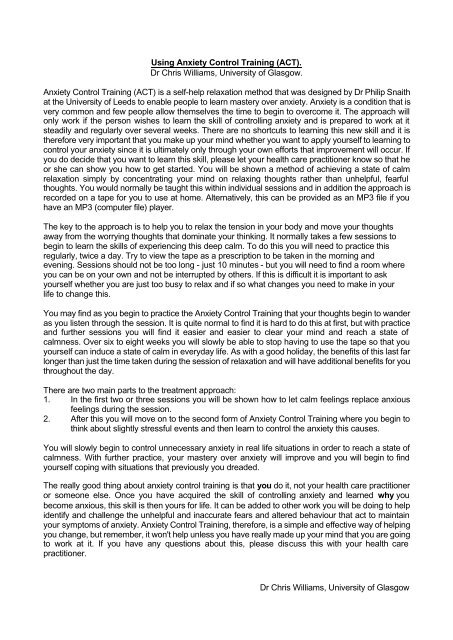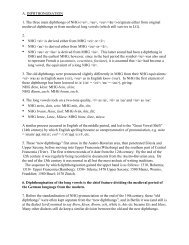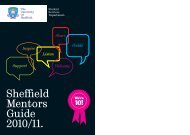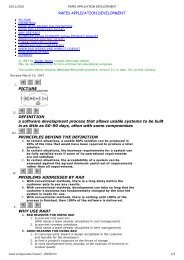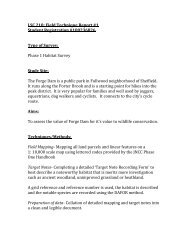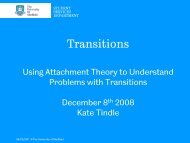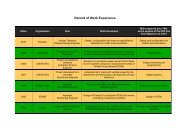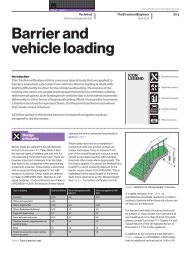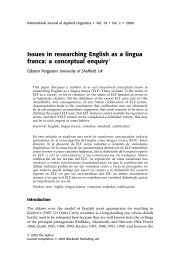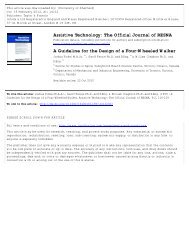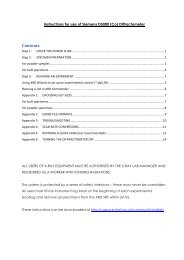Overcoming Anxiety and Depression: Additional worksheet resources.
Overcoming Anxiety and Depression: Additional worksheet resources.
Overcoming Anxiety and Depression: Additional worksheet resources.
Create successful ePaper yourself
Turn your PDF publications into a flip-book with our unique Google optimized e-Paper software.
Using <strong>Anxiety</strong> Control Training (ACT).<br />
Dr Chris Williams, University of Glasgow.<br />
<strong>Anxiety</strong> Control Training (ACT) is a self-help relaxation method that was designed by Dr Philip Snaith<br />
at the University of Leeds to enable people to learn mastery over anxiety. <strong>Anxiety</strong> is a condition that is<br />
very common <strong>and</strong> few people allow themselves the time to begin to overcome it. The approach will<br />
only work if the person wishes to learn the skill of controlling anxiety <strong>and</strong> is prepared to work at it<br />
steadily <strong>and</strong> regularly over several weeks. There are no shortcuts to learning this new skill <strong>and</strong> it is<br />
therefore very important that you make up your mind whether you want to apply yourself to learning to<br />
control your anxiety since it is ultimately only through your own efforts that improvement will occur. If<br />
you do decide that you want to learn this skill, please let your health care practitioner know so that he<br />
or she can show you how to get started. You will be shown a method of achieving a state of calm<br />
relaxation simply by concentrating your mind on relaxing thoughts rather than unhelpful, fearful<br />
thoughts. You would normally be taught this within individual sessions <strong>and</strong> in addition the approach is<br />
recorded on a tape for you to use at home. Alternatively, this can be provided as an MP3 file if you<br />
have an MP3 (computer file) player.<br />
The key to the approach is to help you to relax the tension in your body <strong>and</strong> move your thoughts<br />
away from the worrying thoughts that dominate your thinking. It normally takes a few sessions to<br />
begin to learn the skills of experiencing this deep calm. To do this you will need to practice this<br />
regularly, twice a day. Try to view the tape as a prescription to be taken in the morning <strong>and</strong><br />
evening. Sessions should not be too long - just 10 minutes - but you will need to find a room where<br />
you can be on your own <strong>and</strong> not be interrupted by others. If this is difficult it is important to ask<br />
yourself whether you are just too busy to relax <strong>and</strong> if so what changes you need to make in your<br />
life to change this.<br />
You may find as you begin to practice the <strong>Anxiety</strong> Control Training that your thoughts begin to w<strong>and</strong>er<br />
as you listen through the session. It is quite normal to find it is hard to do this at first, but with practice<br />
<strong>and</strong> further sessions you will find it easier <strong>and</strong> easier to clear your mind <strong>and</strong> reach a state of<br />
calmness. Over six to eight weeks you will slowly be able to stop having to use the tape so that you<br />
yourself can induce a state of calm in everyday life. As with a good holiday, the benefits of this last far<br />
longer than just the time taken during the session of relaxation <strong>and</strong> will have additional benefits for you<br />
throughout the day.<br />
There are two main parts to the treatment approach:<br />
1. In the first two or three sessions you will be shown how to let calm feelings replace anxious<br />
feelings during the session.<br />
2. After this you will move on to the second form of <strong>Anxiety</strong> Control Training where you begin to<br />
think about slightly stressful events <strong>and</strong> then learn to control the anxiety this causes.<br />
You will slowly begin to control unnecessary anxiety in real life situations in order to reach a state of<br />
calmness. With further practice, your mastery over anxiety will improve <strong>and</strong> you will begin to find<br />
yourself coping with situations that previously you dreaded.<br />
The really good thing about anxiety control training is that you do it, not your health care practitioner<br />
or someone else. Once you have acquired the skill of controlling anxiety <strong>and</strong> learned why you<br />
become anxious, this skill is then yours for life. It can be added to other work you will be doing to help<br />
identify <strong>and</strong> challenge the unhelpful <strong>and</strong> inaccurate fears <strong>and</strong> altered behaviour that act to maintain<br />
your symptoms of anxiety. <strong>Anxiety</strong> Control Training, therefore, is a simple <strong>and</strong> effective way of helping<br />
you change, but remember, it won't help unless you have really made up your mind that you are going<br />
to work at it. If you have any questions about this, please discuss this with your health care<br />
practitioner.<br />
Dr Chris Williams, University of Glasgow


